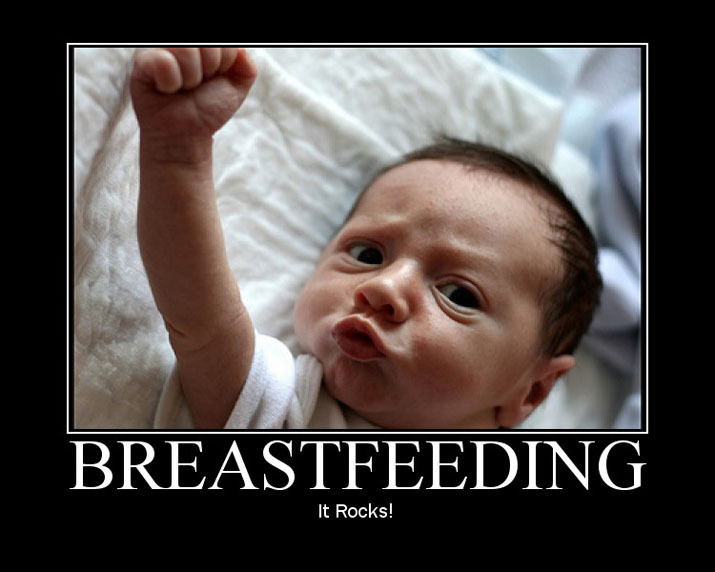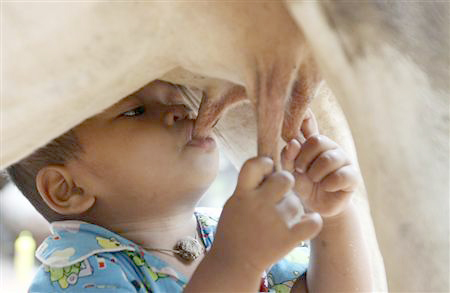Breastfeeding: Is It Still A “Choice”?
Pediatricians, as a general rule, are a lot more “laid back” and a lot less “type A” than other types of physicians – surgeons and neurologists come to mind. We pretty much need to be, or go crazy.
If there is anyone who has internalized the fact that there is rarely, if ever, only one way to do something it’s a pediatrician. Or, knows that “everything changes,” “nothing stays the same,” “things aren’t what they seem” and “plan ‘A’ is almost never what you end up with” – you got it, it’s us!
We never believe that we’ve done enough or have learned enough to make our kids safe and healthy – there’s always more to be learned and to be done. And we’re not above slammin’ on the brakes and flipping this thing into reverse when we discover a new correlation or relationship or method – your mom was advised to put you down to sleep on your stomach, we tell you to put her grandchildren to sleep on their backs.
Breastfeeding Advice Has A History
Breastfeeding is an area of pediatrics which has seen some changes in what we consider good advice and there are some who espouse very strong feelings about their own particular opinion. From experience, it’s an article that is very difficult to write and please everyone.
 It is an area with some “history.” Once in time, when, for some reason or another, a mother wasn’t able to breast feed the family needed to find a willing substitute “wet nurse” to prevent the child from wasting and dying. Later, “Find a cow with the smallest curd and keep her separate from the others” was advice given to farmers wives.
It is an area with some “history.” Once in time, when, for some reason or another, a mother wasn’t able to breast feed the family needed to find a willing substitute “wet nurse” to prevent the child from wasting and dying. Later, “Find a cow with the smallest curd and keep her separate from the others” was advice given to farmers wives.
Cows milk didn’t keep and became infectious easily, which is why canned evaporated milk is credited with saving so many infants around the world – a true break-through. That, of course, was enhanced through research into the infant formula market we know today.
For some years now we all know that research has been slowly trickling in and pediatricians began advising “breast is best” when it’s possible. We haven’t done it at the expense of the “guilt level” on already burdened mothers because formulation has reached such an advanced state in providing alternatives; but, if it is physically possible, we encourage women to take advantage of it.
Where we still fall short a bit, I think, is in clearing roadblocks and providing facilitation. So, I was pleased recently to read a fairly extensive article in the leading OB/GYN journal about the topic.
Breastfeeding Benefits
Let me just present in bullet form some research findings that were recently presented in the Journal of Obstetrics and Gynecology, and what the OB/GYN experts are advising. You’ll want to consider and weigh all these things in order to make an informed choice.
- Breast-feeding may reduce the incidence of common childhood infections, including ear infection and gastrointestinal tract infection resulting in diarrhea.
- Lower rates of common childhood infections reduce parental absenteeism from work.
- Children who were breast-fed in infancy have lower rates of childhood obesity than those who were not.
- Women who breast-feed have lower rates of hypertension, hyperlipidemia, diabetes, cardiovascular disease, ovarian cancer, and breast cancer than those who do not.
- Breast-feeding enhances mother-infant bonding.
- Women who breast-feed are at lower risk for postpartum depression than those who do not.
- Breast-feeding facilitates postpartum weight loss.
- Breast-feeding reduces the risk for unintended pregnancy.
- Obstetrician-gynecologists can help underserved women overcome barriers to breast-feeding.
Breastfeeding-friendly Hospital Practices
This is what the OB/GYN authors desire all hospitals to do.
- A supportive, written breast-feeding policy should be developed, maintained, and communicated to all healthcare staff.
- All appropriate healthcare staff should be trained in the skills needed to carry out this policy.
- All pregnant women should be educated about the benefits of breast-feeding.
- All mothers should be given the opportunity to start breast-feeding within 1 hour of delivery.
- Breast-feeding mothers should be shown how to breast-feed and how to maintain lactation even if they are separated from their infants.
- Unless medically indicated, newborns who are breast-fed should receive only breast milk.
- All mothers and newborns should be encouraged to remain together during their hospital stay, preferably with a rooming-in arrangement.
- When the newborn shows hunger cues or signals, or whenever the mother requests it, unrestricted breast-feeding should be encouraged.
- Infants should not be given any pacifiers or artificial nipples, which should promote exclusive suckling at the breast.
- Mothers should be referred to established breast-feeding support groups and services, and clinicians should assist in establishing these services when they are not available.

4 Posts in Breastfeeding (breastfeeding) Series
- Recommendations and standards – 24 Mar 2015
- Research findings – 16 Mar 2015
- OBGYN Guidelines about breastfeeding – 26 Feb 2014
- Breastfeeding Series: Intro/Index – 20 Feb 2014
Advertisement by Google
(sorry, only few pages have ads)

